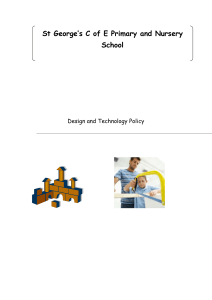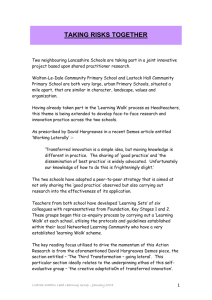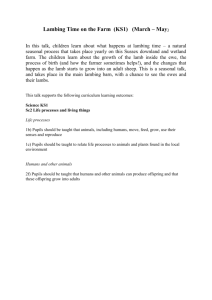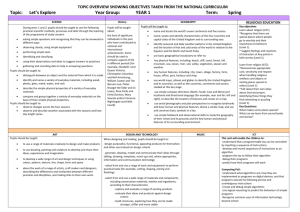Curriculum Policy - Wenlock Church of England Junior School
advertisement
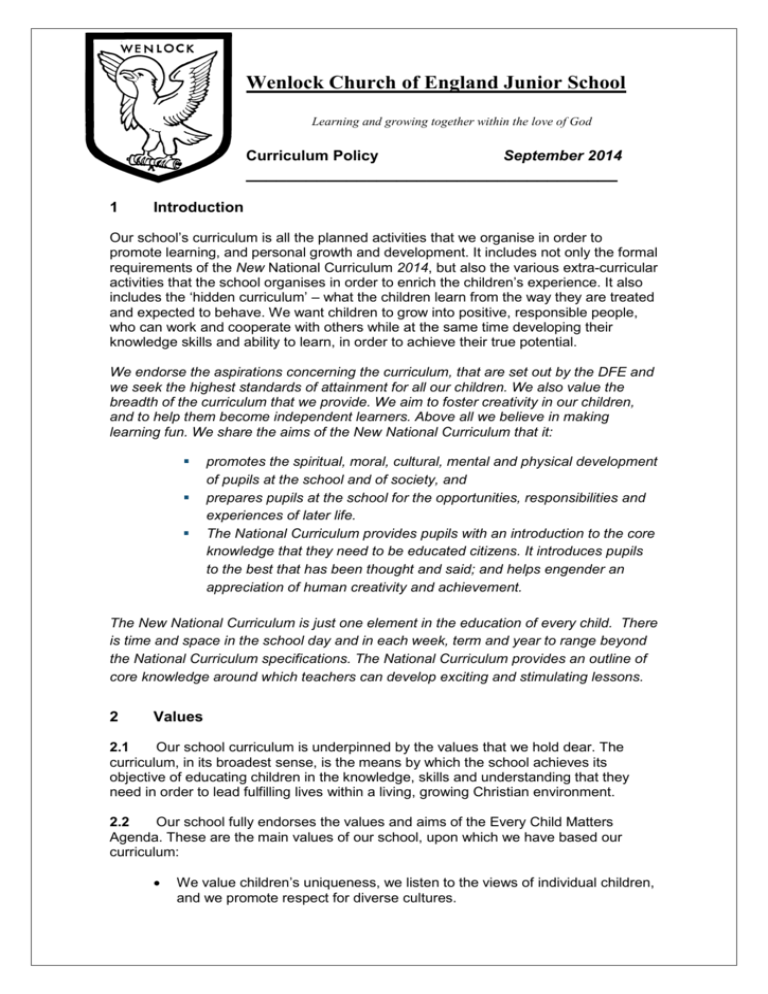
Wenlock Church of England Junior School Learning and growing together within the love of God Curriculum Policy September 2014 _____________________________________ 1 Introduction Our school’s curriculum is all the planned activities that we organise in order to promote learning, and personal growth and development. It includes not only the formal requirements of the New National Curriculum 2014, but also the various extra-curricular activities that the school organises in order to enrich the children’s experience. It also includes the ‘hidden curriculum’ – what the children learn from the way they are treated and expected to behave. We want children to grow into positive, responsible people, who can work and cooperate with others while at the same time developing their knowledge skills and ability to learn, in order to achieve their true potential. We endorse the aspirations concerning the curriculum, that are set out by the DFE and we seek the highest standards of attainment for all our children. We also value the breadth of the curriculum that we provide. We aim to foster creativity in our children, and to help them become independent learners. Above all we believe in making learning fun. We share the aims of the New National Curriculum that it: promotes the spiritual, moral, cultural, mental and physical development of pupils at the school and of society, and prepares pupils at the school for the opportunities, responsibilities and experiences of later life. The National Curriculum provides pupils with an introduction to the core knowledge that they need to be educated citizens. It introduces pupils to the best that has been thought and said; and helps engender an appreciation of human creativity and achievement. The New National Curriculum is just one element in the education of every child. There is time and space in the school day and in each week, term and year to range beyond the National Curriculum specifications. The National Curriculum provides an outline of core knowledge around which teachers can develop exciting and stimulating lessons. 2 Values 2.1 Our school curriculum is underpinned by the values that we hold dear. The curriculum, in its broadest sense, is the means by which the school achieves its objective of educating children in the knowledge, skills and understanding that they need in order to lead fulfilling lives within a living, growing Christian environment. 2.2 Our school fully endorses the values and aims of the Every Child Matters Agenda. These are the main values of our school, upon which we have based our curriculum: We value children’s uniqueness, we listen to the views of individual children, and we promote respect for diverse cultures. We value the spiritual and moral development of each person, as well as their intellectual and physical growth. We value the importance of each person in our community, and we organise our curriculum to promote inclusion, cooperation and understanding among all members of our community. We value the rights enjoyed by each person in our society. We respect each child in our school for whom they are, and we treat them with fairness and honesty. We want to enable each person to be successful, and we provide equal opportunities for all our pupils. We will strive to meet the needs of all our children, and to ensure that we meet all statutory requirements regarding inclusion. We value our environment, and we want our pupils to learn, through our curriculum, how we should take care of the world, not only for ourselves, but also for future generations. At Wenlock C of E Junior School we give regular thought to how values can be used to support the child as a reflective learner and promote equality through quality teaching and learning. The school recognises and values all individuals no matter what their ethnicity, gender, disability and special educational need and social background. 3 Aims 3.1 The aims of our school curriculum are: to enable all children to learn and become learners, developing their skills, to the best of their ability; to promote a positive attitude towards learning, so that children enjoy coming to school, and acquire a solid basis for lifelong learning; to teach children the basic skills of literacy, numeracy and information and computing; to enable children to be creative and to develop their own thinking; to teach children about the developing world, including how their environment and society have changed over time; to help children understand Britain's cultural heritage; to appreciate and value the contribution made by all ethnic groups in our multi-cultural society; to enable children to be positive citizens; to fulfil all the requirements of the National Curriculum and our Agreed Syllabus for Religious Education; to teach children to have an awareness of their own spiritual development, and to distinguish right from wrong; to help children understand the importance of truth and fairness, so that they grow up committed to equal opportunities for all; to enable children to have respect for themselves and high self-esteem, and to live and work cooperatively with others. 4 Organisation and planning 4.1 Through our medium-term plans we give clear guidance on the key skills, objectives and teaching strategies for each topic. 4.2 Our short-term plans are those that our teachers write on a weekly or daily basis. We use these to set out the learning objectives and success criteria for each session, and to identify what resources and activities we are going to use in the lesson. 4.3 We teach the foundation subjects in a cross curricular and thematic way. We track progress ensuring that in due course, each child has the opportunity to experience the full range of the New National Curriculum subjects and development of all key skills. An overview of the themes taught can be found in Appendix A. 5 The curriculum and inclusion 5.1 The curriculum in our school is designed to be accessed by all children who attend the school. If we think it necessary to modify some children’s access to the curriculum, in order to meet their needs, then we do this only after their parents have been consulted. 5.2 If children have special needs, our school does all it can to meet the individual needs, and we comply with the requirements set out in the SEN Code of Practice. If a child displays signs of having special needs, then his/her teacher makes an assessment of this need. In most instances the teacher is able to provide the resources and educational opportunities that meet the child’s needs, within normal class organisation. If a child’s need is more severe, we involve the appropriate external agencies in making an assessment. In some cases we will apply to the Local Authority for Statutory Assessment. We always provide additional resources and support for children with special needs. 5.3 The school uses provision mapping to track the interventions that children who are on the Special Needs register access which enables us to ensure their needs are met. Those children on the Special Needs Register who have a Statement of Special Needs have an Individual Educational Plan (IEP). This sets out the nature of the special need, and outlines how the school will aim to address it. The IEP also sets out targets for improvement, so that we can review and monitor the progress of those children at regular intervals. 5.4 Some children in our school have disabilities. We are committed to meeting the needs of these children, as we are to meeting the needs of all groups of children within our school. The school complies with the requirements of the Disability Discrimination Act. All reasonable steps are taken to ensure that these children are not placed at a substantial disadvantage compared to non-disabled children. Teaching and learning is appropriately modified for children with disabilities. For example, they may be given additional time to complete certain activities, or the teaching materials may be adapted. 5.5 The school has implemented the recommendations of The Stephen Lawrence Inquiry: Macpherson Report (1999). Our schemes of work address the diversity of our society, and reflect the National Curriculum programmes of study. 6 The role of the subject leader 6.1 The role of the subject leader is to: provide a strategic lead and direction for the subject; support and advise colleagues on issues related to the subject; monitor pupils’ progress in that subject area; provide efficient resource management for the subject. 6.2 Where possible the school gives core subject leaders non-contact time, so that they can carry out their duties. It is the role of each core subject leader to keep up to date with developments in their subject, at both national and local level. They review the way the subject is taught in the school, and plan for improvement. This development planning links to whole-school objectives. Core subject leaders review the curriculum plans for the subject, ensures that there is full coverage of the New National Curriculum, and sees that progression is planned into schemes of work. The core subject leader also keeps a portfolio of children’s work, which s/he uses to illustrate the achievements of children at each key stage, and to exemplify the attainment expected. 7 Monitoring and review 7.1 Our governing body’s curriculum committee is responsible for monitoring the way the school curriculum is implemented. 7.2 There is a named governor assigned to each of the following areas: literacy, numeracy, science, RE and Computing. These governors liaise with the respective subject leaders, and monitor closely the way these subjects are taught. There is also a named governor assigned to special needs, who liaises with the SEN coordinator, and monitors the ways in which special needs are addressed. 7.3 The headteacher is responsible for the day-to-day organisation of the curriculum. The headteacher regularly monitors the weekly lesson plans for all teachers, ensuring that all classes are taught the full requirements of the National Curriculum, and that all lessons have appropriate learning objectives. 7.4 Core subject leaders monitor the way their subject is taught throughout the school. They examine long-term and medium-term planning, and ensure that appropriate teaching strategies are used. Core subject leaders also have responsibility for monitoring the way in which resources are stored and managed. 7.5 This policy is monitored by the governing body and will be reviewed annually. Reviewed: September 2014 Review date: September 2015




![afl_mat[1]](http://s2.studylib.net/store/data/005387843_1-8371eaaba182de7da429cb4369cd28fc-300x300.png)

